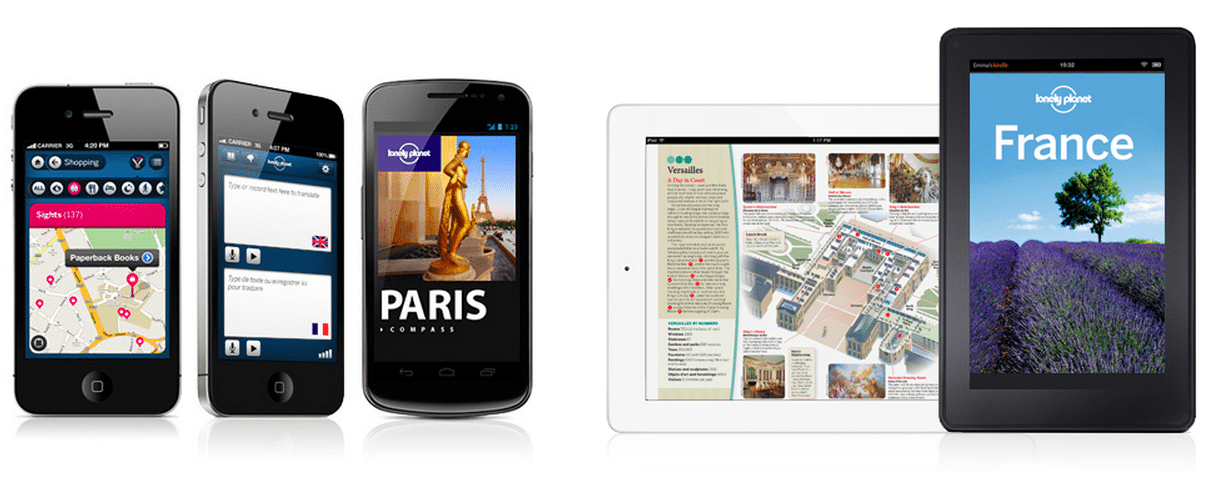Skift Take
Destination content and guides in mobile are still very hard, no one model has broken out, and a mix of apps targeting locals -- through utility -- and travelers -- through content -- seems to be the way to go. Larger players like Lonely Planet and others are now focusing on ebooks and mobile as a marketing channel.
Ed’s note: The reporting on this story was done in between our exclusive on LP’s sale and announcement on its sale yesterday.
Lonely Planet’s Brice Gosnell is a busy man these days. As Lonely Planet’s vice president of publishing in the Americas, he’s currently reviewing the guidebook brand’s digital publishing strategy, and the economics of mobile apps and ebooks are not making it an easy task.
“With mobile, you have to be constantly evolving. What we have to date makes it more difficult to pivot,” he said.
Lonely Planet’s mobile portfolio is saddled with apps that Gosnell calls “historical products” that are difficult to support financially. Lonely Planet publishes free apps for iOS, Android and Nokia. Users can buy content in the app, ranging from guidebooks that cost about $4 to phrase translators. It also publishes ebooks for Kindle, Nook and iPad that range from free to about $18 each. Gosnell says most of those apps may have to go in a digital spring-cleaning.
“A lot of our Android and Nokia product are historical products. They’re from deals that were done a few years back. Whether or not we are going to maintain those products in the future… it’s very hard to support that,” he said.
Shifting landscape in mobile content
Research from PhocusWright suggests that travelers overwhelmingly favor accessing websites rather than apps from their phones while traveling. A report on mobile usage among travelers from last January showed that 30% of travelers in the study mainly used websites with occasional app use, while only 9% reported doing it the other way around.
Lonely Planet’s position is an example of the shifting landscape for travel content at destinations as companies come to terms with consumer behavior on mobile devices.
While personalization seems to be the favored content strategy, there’s still no consensus on the best way for a city app to generate revenues. Gosnell says that while the company’s mobile apps have been profitable so far, he doesn’t think those profits are sustainable.
Instead, Gosnell thinks Lonely Planet’s mobile apps will not only be niche products that will rely on a mix of licensed and original content, they’ll have to subsidized by digital products with fatter profit margins like ebooks. He says that future Lonely Planet apps will include advertising and the possibility of sponsored content.
Apps vs ebooks
There are different consumer expectations from those two products, and Lonely Planet has learned a lot of lessons there. “With an app, people are expecting lower priced product or free. With an ebook, well it’s a book, it’s not going to be $3.99 or something like that.”
“There’s starting to become more of a convergence; once the tablet came out, that really got publishers excited. We started having a platform that we could include some of the enhancements and functionalities. Unfortunately within the ebook it’s still limited, doesn’t go as far as where we all like it to. The balance…what can a mobile platform allow us to do and lead us to an ebook?”
“An ebook has a higher return on investment, and it has much stronger distribution. With an app, people are expecting a lower priced product or free,” he says. “What can we get from our ebook business, and is there a fund there for our mobile builds?”
Lonely Planet’s future mobile strategy will adopt an editorial approach that’s focused on niche demographics. Gosnell says that city apps have become a mass of undifferentiated information. He’s been talking to partners who publish specialized, highly local content that Lonely Planet can license to develop co-branded titles. Gosnell says future Lonely Planet mobile products could be “branded Lonely Planet and powered by your company” and operate on a revenue split.
“If there are people who are doing something that I think is interesting, and I can actually partner with them to feed their content into a new build, I have no reservations about doing that.”
“There’s one partner in particular I’m having discussions with, who’s doing something really interesting in terms of local itineraries, but his market are all locals. The information he’s getting, what he’s offering, is a differentiated content model, and to me, that’s someone I want to continue talking with,” Gosnell says.
The Daily Newsletter
Our daily coverage of the global travel industry. Written by editors and analysts from across Skift’s brands.
Have a confidential tip for Skift? Get in touch
Tags: apps, lonely planet
